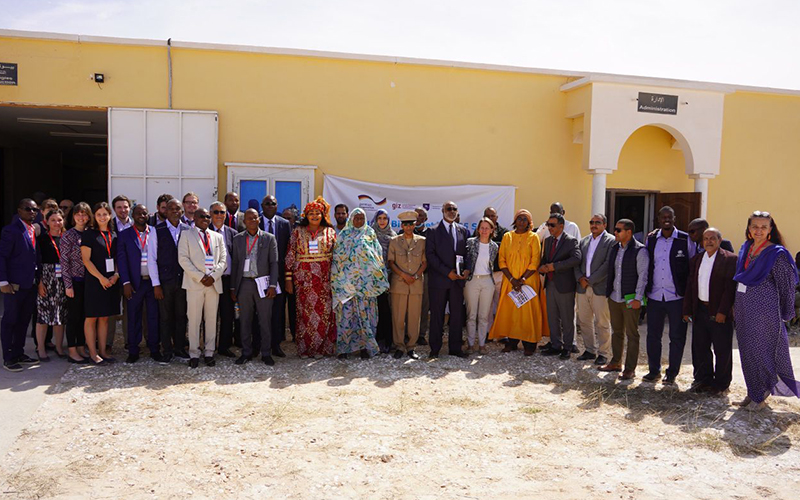
Key players in the health sector and One Health gathered at the ceremony day.
The project partners (Mérieux Foundation, GIZ and IMB) and representatives of the biosecurity network of the G5 Sahel countries (Burkina Faso, Mali, Mauritania, Niger and Chad) came together to prepare for this deployment. On this occasion, ten participants (two from each country) were trained in the use of a mobile laboratory, including how to operate the various workstations in the mobile laboratory and how to work as a team, in the context of an epidemic simulation. More specifically, topics that were examined in detail included the accuracy and promptness of diagnosis, the delivery of results to health services and communication with the authorities.
The deployment exercise took place over two weeks, from November 13 to 25, 2022, and demonstrated the capacity for the deployment of a mobile laboratory in the G5 Sahel region in the event of an epidemic threat. This is the sixth deployment exercise to have been carried out, with five others already successfully completed since 2014, three of which were with the G5 Sahel rapid intervention team.
These training and deployment stages allowed the participants to be trained in working practices in the mobile laboratory, including setting up and dismantling the laboratory, as well as communications with health authorities and team organization. The participants learned how to react to a biological threat such as a pandemic, by responding to a request for the intervention of a mobile laboratory in the network. They were also trained in the administrative and communications tasks involved in transferring the mobile laboratory from one country to another.
These important achievements were celebrated by the parties involved in the mobile laboratory project and in healthcare services in the region at a ceremony organized on November 24, 2022. The dignitaries attending the event included the prefect, the mayor, the President and the Governor of the South Nouakchott region, the interim Executive Secretary of G5 Sahel, the General Secretary of the Ministry of Health, the German ambassador, the WHO representative in Mauritania, the Director of Military Health, the representative of the President of the University of Nouakchott, and the deputy Director General of the INRSP.
The ceremony was an opportunity to present the mission and the project to the institutions present and to emphasize the fact that the mobile laboratory and the G5 Sahel Biosecurity Network must be integrated into national response plans in order to promote the sustainable use of mobile laboratory capacities and the team’s skills.
Finally, the representatives of the G5 Sahel Biosecurity Network met to discuss the future of the network, the rotation of the coordination role, the adoption of resolutions and the renewal of their collaboration agreement.
About the G5 Sahel Biosecurity Network:
This project aims to boost the capacity of the G5 Sahel countries to respond more effectively to natural or intentional biological threats, such as the emergence of an epidemic, acts of bioterrorism or other dangerous biological risks, by providing technical and practical on-site training delivered by a team from the Bundeswehr Institute of Microbiology (IMB).
Experts from G5 Sahel laboratories are trained in modern diagnosis techniques and in biosafety and biosecurity issues, using their institution’s mobile laboratory equipment and/or the G5 Sahel mobile laboratory in Mali. The long-term aim is to reinforce the G5 Sahel Biosecurity Network, its rapid intervention team and their operating methods.
